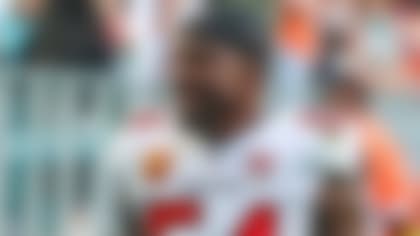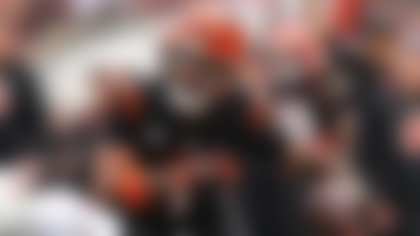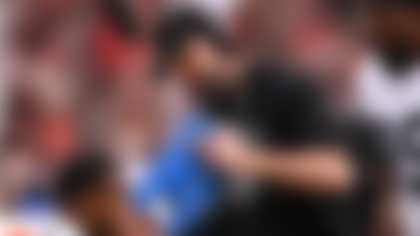By Bill Bradley, contributing editor
When NFL Network and ESPN peek their cameras into the 32 war rooms during next week's NFL draft, look closely. There might be a doctor in the house.
Most NFL teams will have a team physician or trainer in the room when they are making their picks during the Thursday-Saturday event. Dr. Matt Matava, the St. Louis Rams' team physician, will be on hand when his NFC West team makes its picks.
He said the Rams are indicative of how teams consult with their doctors during the draft.
"I'm there on premises during the entire draft," said Matava, who also is the president of the NFL Physicians Society. "When our pick is coming up, say two picks away, they may say, 'We're interested in this player from a certain school. How does he compare to this player from another school because they both play the same position and they both may have similar perceived abilities. How would you rate this guy compared to this guy?'
"I would go over my notes and X-rays and examination findings in my notes. Then I would render an opinion based on his ability to play at a professional level."
Matava said Friday during his draft preparation that his medical information even considers the round a player might be drafted.
He said most NFL teams have a medical representative on site during the draft. If not a physician, then it normally is a head athletic trainer as a medical consultant.
"Some of my friends in the league don't go to the draft on draft day, but they're available by phone if necessary," he said.
Matava said the doctor's role in the NFL Draft actually begins at the NFL Scouting Combine in Indianapolis during late February. That's when medical representatives from every team examine the physicals of more than 320 pro football prospects.
"They go through a battery of interviews with coaches, they lift 225 pounds, they do 40-yard dashes, they do a Wunderlich test," he said. "And then they have a very extensive medical evaluation where each team has the opportunity to evaluate very, very thoroughly each player's medical history and their current physical. We look at a battery of X-rays, a number of tests and evaluate their current health.
"Each team gives them a grade. It's a grade based on what their potential is to play from a health standpoint."
From the combine to the draft, Matava said team doctors are consulted often. One big reason is that the health grade for each player might change frequently.
"That grade may change three or four or five times based on new information of the player's health," he said. "If a new test comes in that was taken after the combine ... when the player who has rare problem -- when a special consultant in that field sees him -- (the specialist) may render an opinion that could change your grade.
"For the most part the grade stays pretty much the same. But every year about 75 players' grades changes from the combine to the actual draft."
The physician's job continues as they re-evaluate players who make pre-draft visits to the teams' training facilities. Also, they have to keep abreast of updates on players during the combine's April re-checks for players whose physicals had red flags during the combine.
"There's about 35 players or so who had some injury at the time of the combine," Matava said. "They come back so we can see how they're developing. Are fractures healing if they had a broken bone for example? If they had surgery near the time of the combine, we couldn't do a thorough examination. They come back to see their potential to play come training camp.
"That may cause our grades to change, too. We just did that evaluation last weekend in Indianapolis."
One example of this occurred last year when University of Utah's Star Lotulelei was sent home from the combine with a heart condition. He was medically cleared when the combine's April medical re-checks found his heart condition to be temporary.
The highly touted defensive lineman was drafted in the first round by the Carolina Panthers with the 14th overall pick after causing concern with his previous ailment. Matava said Lotulelei's grade fluctuated wildly until he got a second opinion.
"If you're one of the coaches or a general manager, you would probably find the same thing," Matava said. "Players (performance) grades fluctuate to a certain extent based on an individual situation based on background checks or performances in their pro day or further discussions with their college coaches or different views when they come in for a site visit.
"There's a lot of information being collected and a lot of that is sort of fluid up until the time of the draft."
At least for Matava, all of his work culminates in a medical meeting the Monday before the draft. That conference includes the general manager, the head coach and other key personnel. It eliminates the need for pointing out problems in the war room during the draft.
"We go over all the questionable guys from a medical standpoint," Matava said. "At that time, they'll ask me pointed questions about players like, 'You rated this guy C-minus. Can you explain why he's a C-minus because we really like him for his playing ability?'
"There I will be able to elaborate and justify the grades I gave them. ... Or they may say, 'Another guy seems to have the same medical problems and you gave him a C-plus. Can you explain the difference?' They get very attuned to details as far as the medical side of things. This is a big time for them, especially the general managers. We always say the draft is the general manager's Super Bowl."
By the time you're watching the draft, team physicians know the reason a key player is falling down the draft board. For the most part, it's because there was a red flag in the player's medical exam, Matava said.
"It happens very frequently," he said. "Most of the time when they fall, we know it's because of a medical problem. When it gets out, it's not from the physicians, but from the player's agent or the coaches that it gets out."
Matava said the original combine physical remains the most important medical aspect of the process and provides the most information on draft day. He said it weeds out the majority of medical issues.
"This is such a thorough examination, sometimes we'll pick up malignancies in players. Sometimes we'll pick up arrhythmias in players," he said. "It's really a sad thing for these players who devote their life to play professional football and they can't because of a medical problem.
" ... All the other things you do at the combine can be done at their pro days. ... But you're never going to have a situation where you get all this medical expertise under one roof, evaluate these players, getting the tests on site to come up with very comprehensive medical assessment of the players. Ultimately, it tends to be the thing that keeps them in the league or keeps them out of the league."



